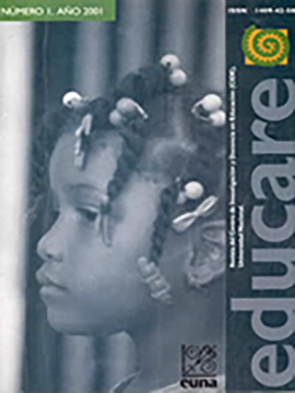Repensando la formación de docentes: oportunidades y desafíos
DOI:
https://doi.org/10.15359/ree.2001-1.6Abstract
From the standpoint of a renovated vision that conceives teacher preparation as a continuing process, the author proposes a series of postulates of particular interest to professors and researchers working in colleges of education. These postulates define parents and students as persons, who having a generic social, familiar and cultural identity, act with full awareness of their abilities, limitations, tasks and responsibilities. They are people who are able to learn about multiple ways to have access to the most sophisticated technological and scientific developments.
Herein lies the notion of an educator, permanently updated in his or her field of study, capable of conceiving, proposing and implementing epistemological, curricular, and methodological changes and breakthroughs. In shore, an academic immersed in a university tha is a laboratory for the conception and development of thoughtand action.References
Ayuste, A. y otros (1994). Planteamientos de pedagogía critica. Barcelona: Edilorial Graó.
Barquero, R. Y otros (1998), Debates Constructivistas Argentina: Alque
Grupo Editor.
Castells, M. y otros (1994) Nuevas perspectivas críticas en Educación.
Barcelona: Paidós Educador.
Frigeiro, G. (1996). El análisis de la institución educativa. Buenos Aires: Santillán
Imbernón, F y otros (1999). La educación del Siglo XXI. Los retos del
futuro inmediato. Barcelona: Editorial Gráo.
Mejía. M. R. (1995). Educación y escuela a fines de siglo. Colombia:
Cinep .
Published
How to Cite
Issue
Section
License
1. In case the submitted paper is accepted for publication, the author(s) FREELY, COSTLESS, EXCLUSIVELY AND FOR AN INDEFINITE TERM transfer copyrights and patrimonial rights to Universidad Nacional (UNA, Costa Rica). For more details check the Originality Statement and Copyright Transfer Agreement
2. REUTILIZATION RIGHTS: UNA authorizes authors to use, for any purpose (among them selfarchiving or autoarchiving) and to publish in the Internet in any electronic site, the paper´'s final version, both approved and published (post print), as long as it is done with a non commercial purpose, does not generate derivates without previous consentment and recognizes both publisher's name and authorship.
3. The submission and possible publication of the paper in the Educare Electronic Journal is ruled by the Journal’s editorial policies, the institutional rules of Universidad Nacional and the laws of the Republic of Costa Rica. Additionally, any possible difference of opinion or future dispute shall be settled in accordance with the mechanisms of Alternative Dispute Resolution and the Costa Rican Jurisdiction.
4. In all cases, it is understood that the opinions issued are those of the authors and do not necessarily reflect the position and opinion of Educare, CIDE or Universidad Nacional, Costa Rica. It is also understood that, in the exercise of academic freedom, the authors have carried out a rogorous scientific-academic process of research, reflection and argumentation thar lays within the thematic scope of interest of the Journal.
5. The papers published by Educare Electronic Journal use a Creative Commons License:















 The articles published by Educare Electronic Journal can be shared with a Creative Commons License:
The articles published by Educare Electronic Journal can be shared with a Creative Commons License: 



